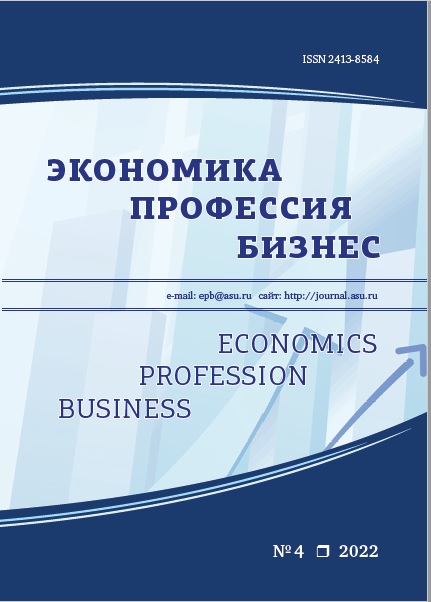TYPES OF CONTROLLING IN THE MANAGEMENT SYSTEM OF INDUSTRIAL ORGANIZATION
УДК 005.6
Abstract
The formation of various types of controlling systems in the management system of industrial organizations acts as the most important economic direction of modern reality, which is primarily caused by the constant growth of difficulties arising in the system of market relations. Controlling acts as a kind of stimulant in relation to managerial processes, which one way or another allows you to «notify» the management of an organization (including industrial) about a potential failure in its work, and the target setting of controlling is precisely to report a «signal» about ongoing changes.
The article discusses the main types of controlling, which are reflected in modern literature. At the same time, it is determined that there is no such type of it as «controlling counterparties», as a result of which the author's definition of this term is formed. It is proposed to understand it as a system that ensures control of customers of industrial products, as well as suppliers, in order to prevent delays in payments, optimize the credit policy in relation to organizations that delay payment, which, in turn, causes additional financial losses associated with the diversion of funds.
Downloads
Metrics
References
Шляго Н. Н. Контроллинг. Теория и практика: учебник и практикум для вузов. М., 2021. 197 с.
Зимненко И. А. Проблемы внедрения контроллинга на промышленных предприятиях в современных условиях // Инновации в материаловедении и металлургии: материалы III Междунар. интерактив. науч.-практ. конф. Екатеринбург, 2013. С. 280-283.
Левкин Г. Г., Куршакова Н. Б. Контроллинг логистических систем: учебное пособие для вузов. 2-е изд., испр. и доп. М., 2021. 167 с.
Управление затратами и контроллинг: учебное пособие для вузов / А. Н. Асаул, И. В. Дроздова, М. Г. Квициния, А. А. Петров. М., 2021. 263 с.
Контроллинг: теория и практика: учебник и практикум для вузов / С. В. Осипов и др.; под общ. ред. С. В. Осипова. М., 2022. 145 с.
Морозова А. А. Особенности классификации методов и инструментов контроллинга // Экономические и социальные аспекты развития энергетики: Пятнадцатая международная научно-техническая конференция студентов, аспирантов и молодых ученых: материалы конференции. В 6 томах. Иваново, 2020. С. 38.
Сибагатуллина Р. М., Пономарева Л. Н., Гильмутдинова Р. А. Контроллинг как концепция управления организацией // Экономика и управление: научно-практический журнал. 2021. № 2 (158). С. 110114. DOI: 10.34773/EU. 2021.2.20.
Управление затратами и контроллинг: учебное пособие для вузов / А. Н. Асаул, И. В. Дроздова, М. Г. Квициния, А. А. Петров. М., 2021. 263 с.
Шнайдер О. В., Гаврилов Д. В. Контроллинг: цель, задачи, инструмент увеличения прибыли экономического субъекта // Балканское научное обозрение. 2020. Т. 4. № 4 (10). С. 66-68. DOI: 10.34671/SCH. BSR. 2020.0404.0015.
Банк России принял решение повысить ключевую ставку на 100 б. п., до 8,50 % годовых. URL: https://www.cbr.ru/press/keypr/ (дата обращения: 11.01.2022).
REFERENCES
Shlyago N. N. Controlling. Theory and practice: textbook and workshop for universities. M., 2021. 197 p.
Zimnenko I. A. Problems of controlling implementation at industrial enterprises in modern conditions // Innovations in Materials Science and Metallurgy: Materials of the III International interactive. Scientific and practical conference. Yekaterinburg, 2013. Pp. 280-283.
Levkin G. G., Kurshakova N. B. Controlling logistics systems: a textbook for universities. 2nd ed., ispr. and add. M., 2021. 167 p.
Cost management and controlling: a textbook for universities / A. N. Asaul, I. V. Drozdova, M. G. Kvitsinia, A. A. Petrov. M., 2021. 263 p.
Controlling: theory and practice: textbook and workshop for universities / S. V. Osipov et al.; under the gen. ed. of S. V. Osipov. M., 2022. 145 p.
Morozova A. A. Features of classification of controlling methods and tools // Economic and social aspects of Energy development: The Fifteenth International Scientific and Technical Conference of Students, Postgraduates and Young Scientists: conference materials. In 6 volumes. Ivanovo, 2020. Pp. 38.
Sibagatullina R. M., Ponomareva L. N., Gilmutdinova R. A. Controlling as an organization management concept // Economics and management: scientific-practical journal. 2021. № 2 (158). Pp. 110-114. DOI: 10.34773/EU. 2021.2.20.
Cost management and controlling: textbook for universities / A. N. Asaul, V. I. Drozdova, M. G. Kvitsinia, A. A. Petrov. M., 2021. 263 p.
Schneider O. V., Gavrilov D. V. Controlling: the purpose, objectives, instrument of increasing the profit of an economic entity // Balkan Scientific Review. 2020. T. 4. № 4 (10). Pp. 66-68. DOI: 10.34671/SCH. BSR. 2020.0404.0015.
The Bank of Russia decided to raise the key rate by 100 bp, to 8.50% per annum. URL: https://www.cbr.ru/press/keypr/ (date of access: 11.01.2022).
Economics Profession Business is a golden publisher, as we allow self-archiving, but most importantly we are fully transparent about your rights.
Authors may present and discuss their findings ahead of publication: at biological or scientific conferences, on preprint servers, in public databases, and in blogs, wikis, tweets, and other informal communication channels.
Economics Profession Business (EPB) allows authors to deposit manuscripts (currently under review or those for intended submission to EPB) in non-commercial, pre-print servers such as ArXiv.
Authors who publish with this journal agree to the following terms:
- Authors retain copyright and grant the journal right of first publication with the work simultaneously licensed under a Creative Commons Attribution License that allows others to share the work with an acknowledgement of the work's authorship and initial publication in this journal.
- Authors are able to enter into separate, additional contractual arrangements for the non-exclusive distribution of the journal's published version of the work (e.g., post it to an institutional repository or publish it in a book), with an acknowledgement of its initial publication in this journal.
- Authors are permitted and encouraged to post their work online (e.g., in institutional repositories or on their website) prior to and during the submission process, as it can lead to productive exchanges, as well as earlier and greater citation of published work (See The Effect of Open Access).









